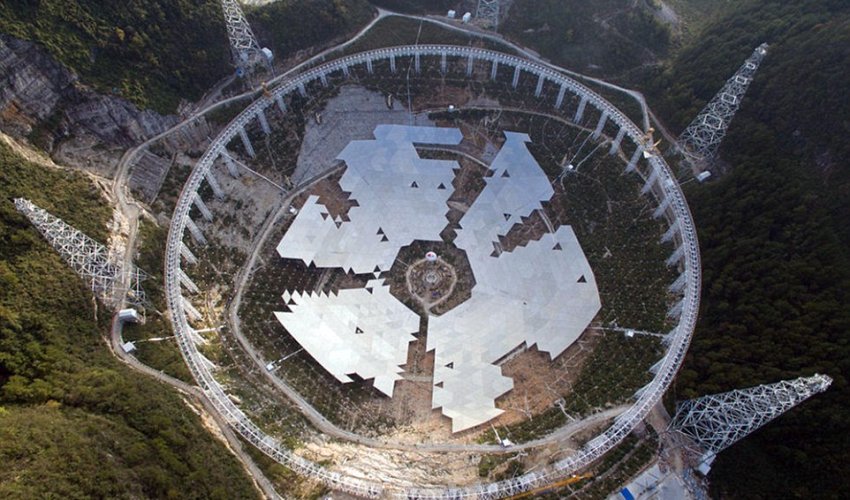China begins testing world's largest radio telescope

Measuring 500 metres in diameter, the world's largest radio telescope is in the final stages of completion, and is being put through its paces with a dry run.
Going by the name of 'FAST' which stands for 'Five-hundred-meter Aperture Spherical Telescope,' the device is being constructed in Guizhou Province, south-west China, reports The People's Daily Online.
It has taken China more than five years to build the world's biggest single-aperture radio telescope which covers the size of 30 football pitches and is currently running on schedule. Scientists carried out the last stages on Saturday, with hopes for a September 2016 completion.
Chinese authorities and engineers tested a key component inside the massive telescope before it goes live indefinitely.
Over the weekend, the retina was successfully installed and tested in the telescope.
A mechanism that weighs 30,000 kilograms and is suspended 160 metres above the reflector dish, which is still unfinished.
According to The China Daily, the reflector dish will collect up signals from the whole universe.
The body of the telescope – which was first proposed in 2003 - is gigantic, measuring 500 metres across (half a mile).
It will take up to 40 minutes to walk around device.
The enormous dish is made up of over 4,500 mostly triangular panels and its side panels measure 11 metres long.
The motion of these panels alter the collective shape of the antenna.
The new antenna is capable of reflecting radio signals from the universe to a focal point, where the receiver dome sits.
Speaking to reporters, Li Di, a chief scientist from the Chinese Academy of Sciences said: 'So far, one of the most important steps has been completed.
'We will finish installing all the panels by June 2016, and strive to debug the whole system by the end of September.'
He added that the design of the telescope is not difficult to understand, very similar to a TV antenna: 'FAST is similar to any television antenna on a roof, but it is so much larger that.
'With a larger signal receiving area and more flexibility, FAST will be able to scan two times more sky area than Arecibo, with three to five times higher sensitivity,' said Li.
Some astronomers have said it will not be long before new discoveries are found because of the advanced technology of FAST.
But not just new ones, Lister Staveley-Smith, an astronomer at the University of Western Australia, expects it to find unknown stars in the Milky Way other more distant galaxies.
'FAST's sensitivity and resolution will allow an extremely comprehensive study of thousands of galaxies in different environments in the local universe,' he said.
After the completion of its detection, FAST is expected to maintain world-class status for the next 20-30 years.
The gigantic radio telescope will cost approximately 1.2 billion Yuan (£124 million), making it the biggest astronomy project China has ever had.
(dailymail.co.uk)
www.ann.az
Similar news
Similar news
Latest news 
More news 



































 Photo
Photo 



 Video
Video 

